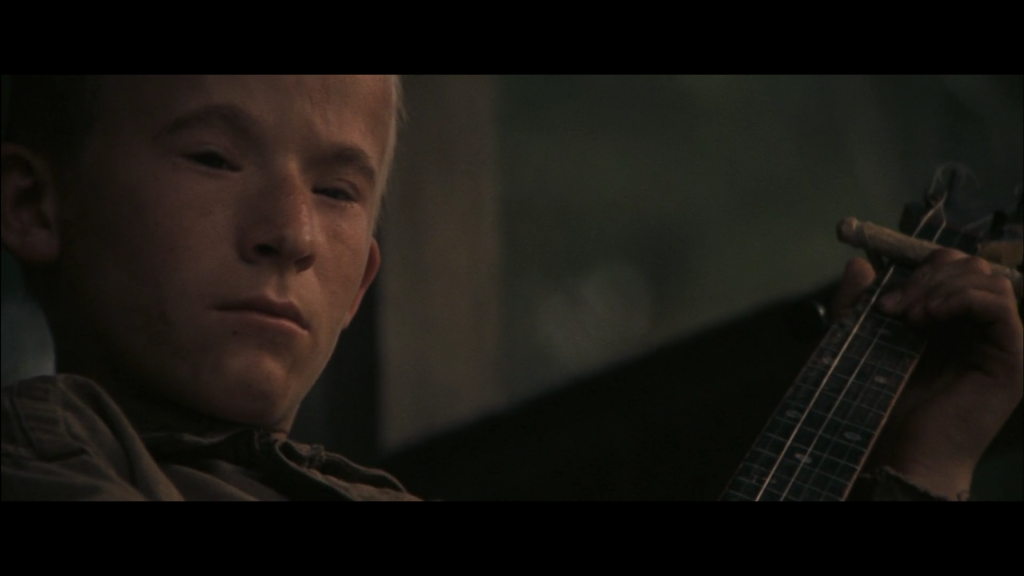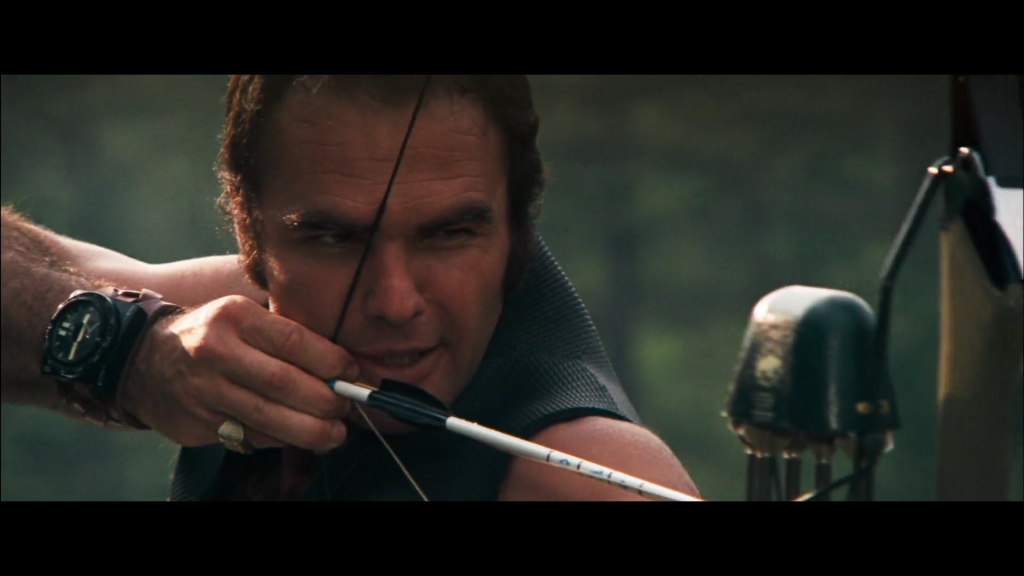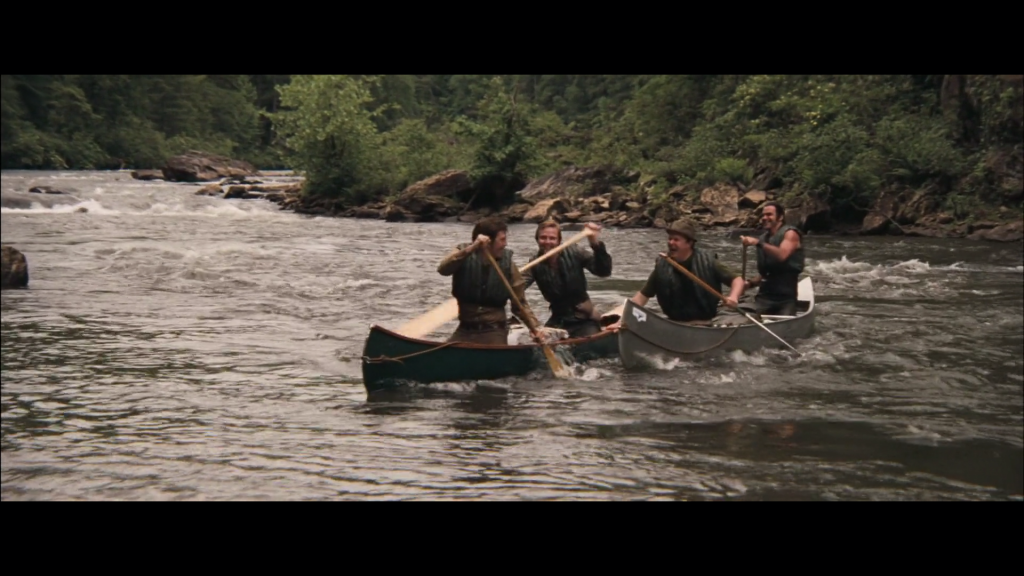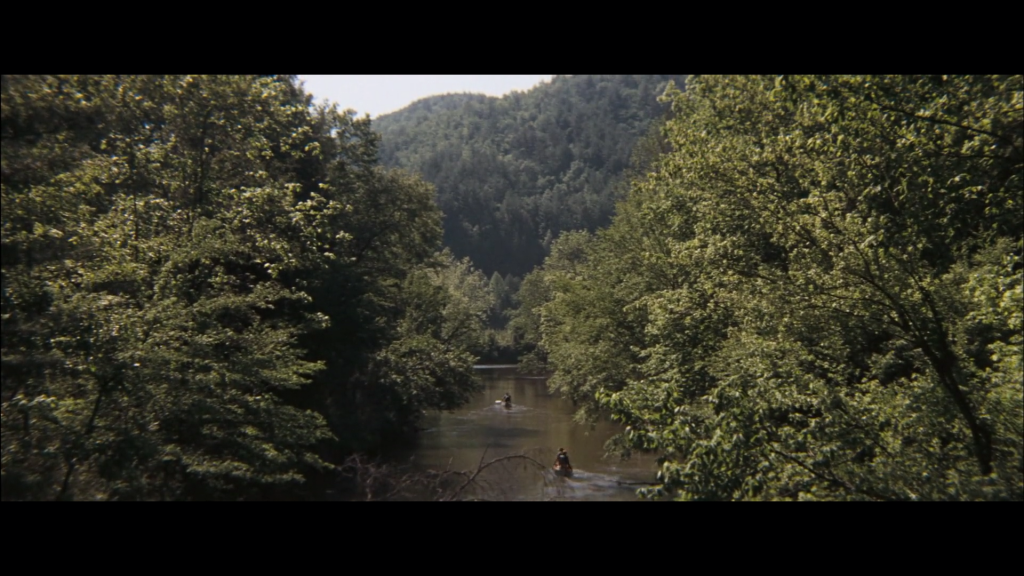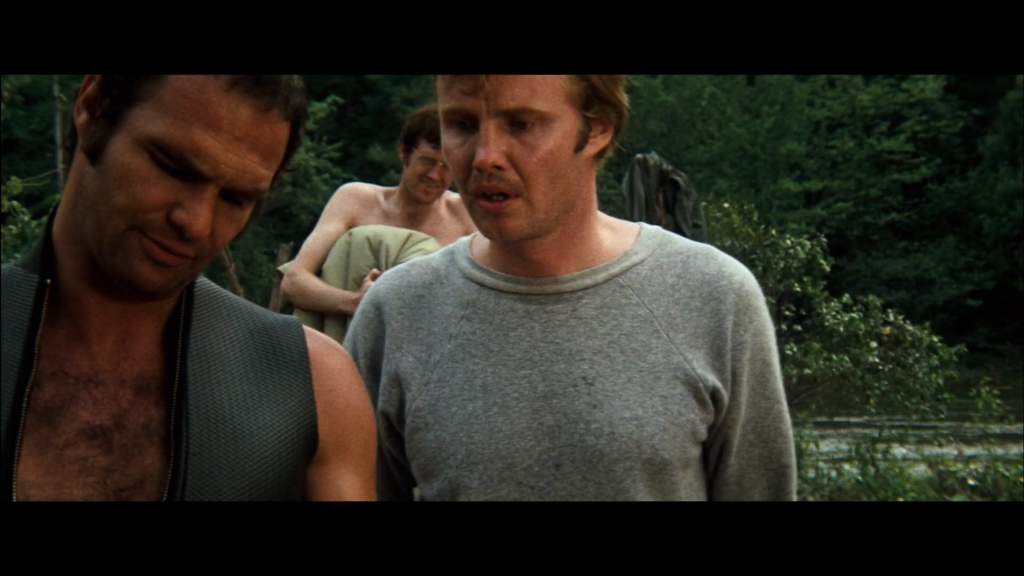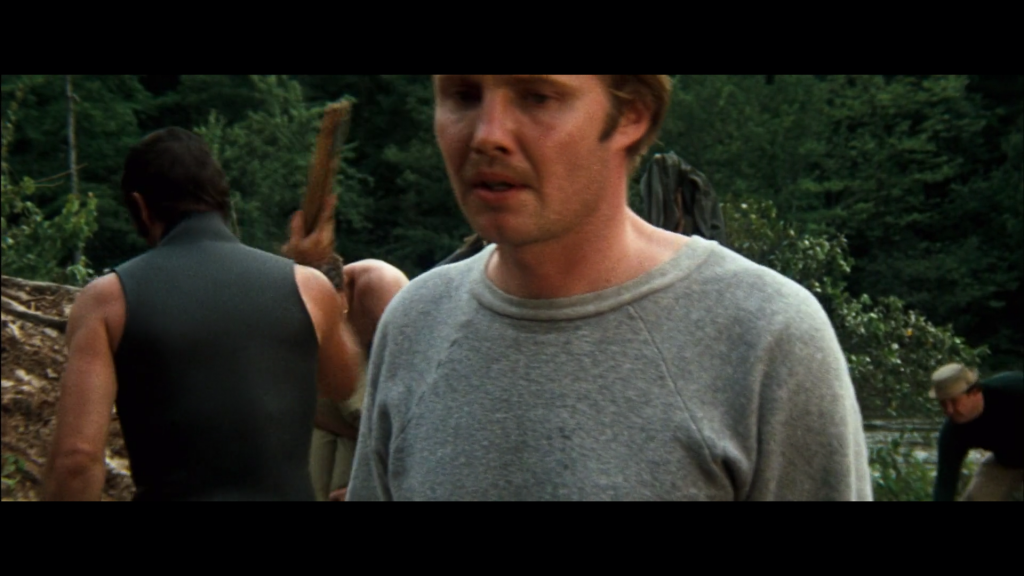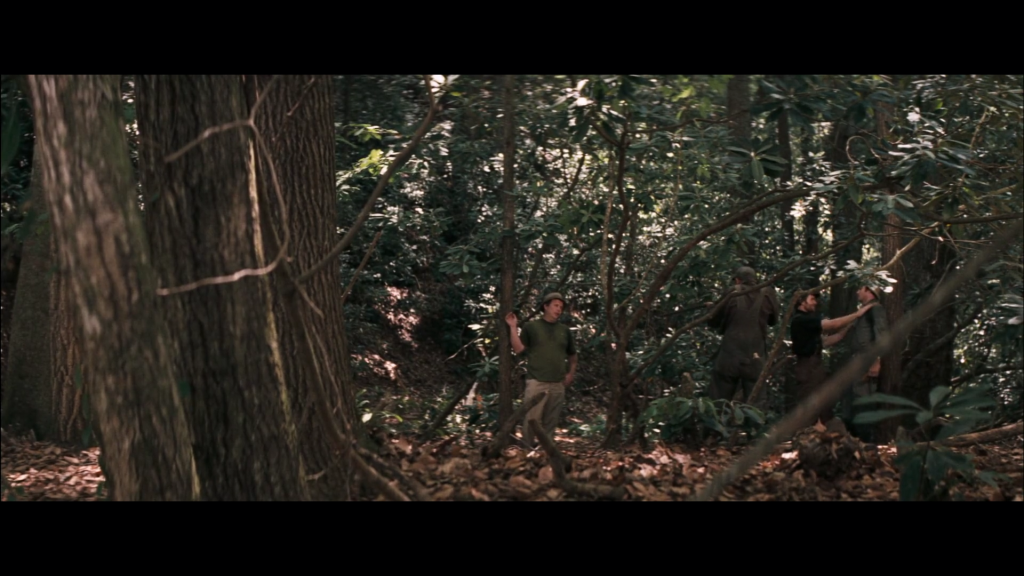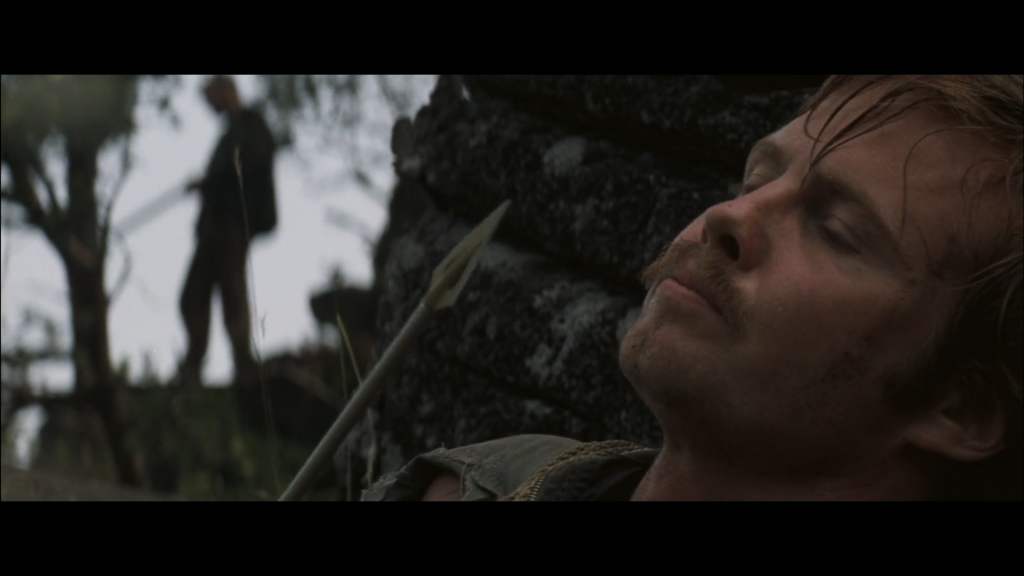We at Deadshirt like to fancy ourselves pretty dedicated to popular culture with a combined knowledge of all things media that borders on the encyclopedic, but no one is perfect. There’s just too much music, too many films, too many comics, and way too many television episodes out there. No longer will we have to harbor the secret shame of not having experienced an expected work. Here is where we fill in the missing gaps. This week we look at the film Deliverance with staff writer Dominic Griffin.
My rationale for never getting around to watching Deliverance during my nearly thirty years on Earth has been based on the sole two things I knew about the film.
1) It takes place in the fucking sticks. I grew up in the ‘burbs of Northern Virginia, a hop, skip, and a jump away from the White House. If there’s one thing I fear more than nature it’s being out in the middle of goddamn nowhere with a bunch of hillbillies.
2) A dude gets raped in it. I’m pretty sure the national phobia for being sexually assaulted by hicks comes directly from this film.
Now, with regards to thing one, letting my biased, narrow-minded view of the South get in the way of seeing Burt Reynolds and Jon Voight at nearly peak levels of hunkiness is just dumb, so I scratched that off the list but quick. As for thing two, I had to really wrestle with why this was a reason at all. I don’t like seeing anyone get raped on screen, ever, but the only other film I’ve ever actively avoided for the depiction of rape is Irreversible because it’s supposed to be the focal point of the narrative and generally movies made specifically to shoot nine-minute rape scenes are decidedly Not My Bag.
All I’ve ever known about Deliverance is “Dueling Banjos” and “Squeal like a pig!” The other night, while watching reruns of Evening Shade on TV Land, it occurred to me that I thought Burt Reynolds was maybe the one who gets raped, and that the prospect of seeing the physical embodiment of ’70s masculinity violated bothered me more than I ever thought it might. Women get raped in films I watch all the time, and I’ve become so desensitized that it’s reduced to an accepted escalation of dramatic terms, but even the abstract notion of Burt Fucking Reynolds getting the same treatment sent me running. Clearly, getting over this double standard was more than enough reason to finally bite the bullet.
Having done so, I’m grateful to report that a) no one rapes Burt Reynolds and b) Deliverance is a damn fine flick.
Reynolds and Voight star as Lewis and Ed, two white collar friends from Atlanta who like to go on excursions into the wild. They embark on a trip into the Georgia wilderness, surrounding an area that’s on the way to being entirely demolished for an upcoming dam project. Lewis is the de facto leader of the group, and Reynolds plays him with a slick, brooding strand of his usual machismo. He makes deliberately arousing facial expressions, spouting dreary aphorisms like Locke from Lost. Everything he does is comically masculine, like capturing fish with a bow and arrow like Oliver fucking Queen. He’s basically that one guy in every group of friends who really wants the world to end so he can be the Robert E. Howard protagonist he’s always dreamed of.
Ed is much more Everyman. He enjoys leaving his family and his boring job behind to play make-believe survivalist with Lewis, but he legitimately treasures the life our society has afforded him. He doesn’t have quite the erection for climbing trees as his friend. Ned Beatty and Ronnie Cox round out the foursome as Bobby and Drew, two guys who couldn’t be less like their trip mates. Bobby is an oafishly rotund salesman, and Drew does insurance, but he has the kind of understated artsy side that might compel a man to bring a giant musical instrument along the ride for a canoe trip.
It’s Drew’s affinity for said instrument that gives us the film’s opening sequence, as the boys try to find two men to drive their cars to the small town of Aintry while they gallivant down “the biggest river in the fucking state.” Drew begins play with a frightening, banjo wielding youth whose virtuoso string picking provides the main theme of the film. No, seriously, there’s a lot of banjo in this movie. It makes the jagged zither from The Third Man feel like fucking Tangerine Dream by comparison. The sequence is shot, much like the rest of the film, using depth. Staging and blocking the action in layers of foreground and background creates interesting dramatic relationships between the players. Director John Boorman uses this opening to foreshadow the uneasy tension between these city slickers and the wooded otherland they’ve found themselves in, intercutting close-ups of Drew and the banjo boy, bouncing back and forth with Ed and Lewis watching the “duel” while the gas station attendant dances between them. It’s well composed and a lot more measured than I expected from the picture, given what little I knew going in.
From there, the film’s first act feels like a bro comedy. Ed and Lewis drive through the woods trying to find this river and bicker about Lewis not wanting to ask for directions. Once they set out on their trip proper, it’s essentially just Guys Being Dudes: The Movie.
That this broventure is set in front of some gorgeous landscape cinematography from Vilmos Zsigmond creates even more suspense, because you just know a movie about four guys in a canoe through a Bob Ross painting can’t remain this idyllic forever.
Lewis seems so at home in this world, while Drew surprises with his adaptability, and everyone is just generally proud of Bobby for not breaking down and begging for Twinkies, I guess. There’s just enough of a homoerotic undertone to Lewis and Ed’s friendship to keep shippers happy, as a quiet sort of tension best describes their otherwise easygoing relationship. Lewis seems bred for this kind of life, and Ed just likes to visit it from time to time. His “part-timer” approach to doing manly shit in the woods is a point of contention, albeit a subtle one.
Ed wakes up early on the second day of the trip to try to do some solo hunting, and it’s pretty fucking sad. Every ounce of Errol Flynn-esque charisma Voight’s been dripping with since the film began sweats away as he fails to kill a deer. His inability to kill a living animal is clearly marked as what stands between he and Lewis. You can see it in his hesitation during this scene, as the men discuss hunting and the psychology thereof.
Senpai won’t notice him until he’s Officially A Real Man.
SPEAKING OF TOXIC MASCULINITY, this is where the rape happens. They split up for the day, Ed with Bobby and Lewis with Drew, and the former are beset upon by what they make out to be some salty moonshiners concerned someone’s staking out their land. They are not salty moonshiners. They’re psychopaths. This entire scene unfolds in slow, excruciating mundanity. It doesn’t feel sensationalized in any way. Because everything feels shot in the round, it’s like you’re right there for this awkward series of misunderstandings that evolves from casual discomfort to life or death denigration. Once the impending threat of violence manifests explicitly, the action moves away from the viewer and we’re forced to watch it unfold from afar, much like Ed, who is tied to a tree with his own belt while one of the men assaults Bobby.
The biggest thing that struck me is how, in modern comedies, “male rape” is often a source of shitty humor. Even here, Ned Beatty’s schlubby shtick feels like a forerunner to every John C. Reilly role ever written, which made me begin to picture Jon Voight as Will Ferrell and the fact that this scene could easily exist in, say, an Adam Sandler film, with slightly different music and played for guffaws, is disturbing as fuck. There are no laughs here, though. It’s horrific in a way I had not anticipated. The actors involved employ such a naturalistic approach to the emotions at play no dramatic scoring or adventurous camera work is necessary. It’s a horrible thing that happens and we can’t do anything to stop it.
Well, we can’t, but Burt Reynolds can. Lewis kills the fuck out of the rapist with an arrow, again besting Ed at being a man, while saving his life in the process. I really, really thought the movie was going to turn into a hicksploitation action flick from here. I figured there’d be an army of similarly horned up evil hillbillies to thwart and Lewis would finally teach Ed how to be A Real Man, and he’d get to land the final killshot and save the day. The rest of the film has more in common with The Tell-Tale Heart than anything I was expecting/hoping for. More people get killed with arrows, yes. Ed does get that kill he’s always wanted, true. But nothing about it feels good.
The rape scene bifurcates the film into two halves, the first exemplified by a comforting certitude of Us vs Them.
Us: Civilized. Nice Hair. Good With Tools. Not At All Interested In Raping Dudes.
Them: Inbred? Very Dirty/Smelly/Ugly Homes. Good At Banjoing! Bad At Humanity.
Once this unforgivable transgression befalls our “heroes,” however, everything becomes less sturdy. Even the film’s strong visual storytelling allows a murkiness to seep in, implying multiple, plausible interpretations of the situations that occur in the ensuing tailspin. It’s as if a switch has been flipped and “the game,” this extended role play at being a cowboy, can now be real. They just don’t account for consequences.
There’s something about the South that makes for an easy scapegoat. Turn the news on and any seemingly liberal dude will pat himself on the back for not screeching the N-word or owning a Confederate flag like “those other guys,” never once even stopping to ponder his own darkness. What I love about Deliverance is that it leverages that old fear of the unknown and of a tribe not your own to force the viewer (many of whom I’d wager really relate to Voight’s character but want to be Burt Reynolds) to come to face with the bitter ending to one of his greatest fantasies.
The extended sequence of Ed hunting the man he thinks is hunting his crew is masterful, striking a balance somewhere between the melodramatic rush of Hitchcock and the kind of measured, stomach churning dread I usually avoid when it comes to choosing films. It’s thrilling and exciting, but once you get that pop, that successful moment scenes like this build to, you feel like such a fucking piece of shit for having lusted after it in the first place.
I don’t want to spoil too much of the film’s last third, because I was honestly grateful for such a surprising change of pace, but it’s important that a film was this willing to make its audience question themselves. I think the last ten minutes overstay their welcome a little. The dramatic shift feels like a misstep narratively, but it provides ample breathing room to question everything you’ve seen before. And how comfortable you are with how you felt about it.

